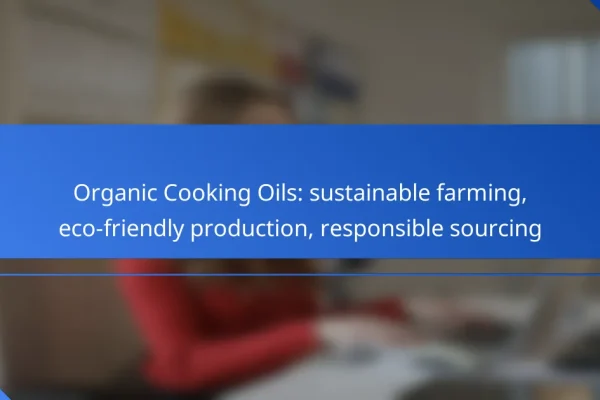How do organic products contribute to sustainability?
Organic products significantly enhance sustainability by promoting environmentally friendly farming practices that reduce harm to ecosystems. They focus on natural processes, which leads to healthier soil, reduced chemical usage, and a smaller carbon footprint.
Reduction of chemical usage
Organic farming minimizes the use of synthetic pesticides and fertilizers, relying instead on natural alternatives. This reduction helps protect biodiversity, as harmful chemicals can adversely affect non-target species, including beneficial insects and wildlife.
Farmers often use methods such as crop rotation, composting, and biological pest control to manage pests and maintain soil fertility. These practices not only reduce chemical dependency but also promote a more balanced ecosystem.
Improved soil health
Organic products contribute to improved soil health through practices that enhance soil structure and fertility. Techniques like cover cropping and reduced tillage increase organic matter, which boosts soil’s ability to retain moisture and nutrients.
Healthy soil supports diverse microbial communities that are essential for nutrient cycling. This leads to more resilient crops and reduces the need for external inputs, making organic farming more sustainable over time.
Lower carbon footprint
Organic farming typically results in a lower carbon footprint compared to conventional methods. By avoiding synthetic fertilizers, which require significant fossil fuel energy for production, organic practices help reduce greenhouse gas emissions.
Additionally, organic farms often implement agroecological practices that enhance carbon sequestration in the soil. This means that they not only emit less carbon but can also capture and store carbon, contributing positively to climate change mitigation.
What are the benefits of choosing organic products?
Choosing organic products offers numerous benefits, including improved health, environmental sustainability, and support for local economies. Organic farming practices prioritize natural methods, which can lead to healthier food options and a reduced ecological footprint.
Healthier food options
Organic products are often free from synthetic pesticides, herbicides, and fertilizers, which can contribute to better health outcomes. Many consumers report fewer allergic reactions and sensitivities when consuming organic foods compared to conventional ones.
Additionally, organic farming typically emphasizes soil health and biodiversity, which can enhance the nutritional content of the food. For example, organic fruits and vegetables may have higher levels of certain vitamins and antioxidants.
Support for biodiversity
Organic farming practices promote biodiversity by avoiding harmful chemicals and fostering a variety of plant and animal species. This approach helps maintain healthy ecosystems, which are crucial for pollination and pest control.
By choosing organic products, consumers support farms that implement crop rotation and polyculture, which can lead to more resilient agricultural systems. This not only benefits the environment but also contributes to sustainable food production.
Enhanced flavor and quality
Many people find that organic products taste better than their conventional counterparts. This is often attributed to the natural growing methods and the absence of artificial additives that can alter flavor profiles.
Organic farming focuses on quality over quantity, allowing crops to mature fully and develop richer flavors. For instance, organic tomatoes are frequently noted for their sweetness and depth of flavor compared to those grown with synthetic fertilizers.
How can consumers identify sustainable organic products?
Consumers can identify sustainable organic products by looking for specific certifications, understanding labeling standards, and seeking brand transparency. These factors help ensure that the products meet environmental and ethical standards.
Certifications to look for
Certifications are key indicators of sustainability in organic products. Look for labels such as USDA Organic, EU Organic, or other recognized certifications that verify adherence to strict organic farming practices. These certifications often require compliance with regulations regarding pesticide use, soil health, and animal welfare.
In addition to organic certifications, consider third-party certifications like Fair Trade or Rainforest Alliance, which emphasize ethical labor practices and environmental stewardship. These can provide additional assurance of sustainability.
Labeling standards
Labeling standards vary by country but generally indicate the level of organic content in a product. For example, in the U.S., a product labeled “100% Organic” must contain only organic ingredients, while “Organic” must contain at least 95% organic ingredients. Understanding these distinctions can help consumers make informed choices.
Be cautious of terms like “natural” or “made with organic ingredients,” as they may not meet the same rigorous standards. Always check the fine print for specific organic percentages and certifications.
Brand transparency
Brand transparency is crucial for identifying sustainable organic products. Brands that openly share their sourcing practices, ingredient origins, and production methods are more likely to adhere to sustainable practices. Look for brands that provide detailed information on their websites or product packaging.
Engaging with brands through social media or customer service can also yield insights into their sustainability efforts. Avoid brands that are vague about their practices or lack certifications, as this may indicate a lack of commitment to sustainability.
What are the challenges in the organic product market?
The organic product market faces several significant challenges that can hinder its growth and accessibility. Key issues include higher production costs, supply chain limitations, and consumer misconceptions that affect purchasing decisions.
Higher production costs
Producing organic products typically incurs higher costs compared to conventional farming. This is due to more expensive organic inputs, labor-intensive practices, and longer crop cycles. As a result, organic products often retail at a premium, which can deter price-sensitive consumers.
Farmers may also need to invest in certifications and comply with strict regulations, adding to their expenses. For instance, obtaining USDA Organic certification in the United States can cost thousands of dollars and require ongoing compliance checks.
Supply chain limitations
The organic supply chain can be less efficient than conventional systems, leading to challenges in availability and distribution. Organic products often face logistical hurdles, such as limited processing facilities and fewer distribution networks. This can result in higher prices and inconsistent product availability in stores.
Additionally, organic products may have shorter shelf lives, requiring more careful handling and quicker turnover. Retailers must manage these factors to ensure that organic items remain fresh and appealing to consumers.
Consumer misconceptions
Many consumers hold misconceptions about organic products, which can impact their purchasing behavior. Some believe that organic means pesticide-free, while others think it guarantees superior nutritional value. These misunderstandings can lead to skepticism about the benefits of organic products.
Education is crucial in addressing these misconceptions. Clear labeling and informative marketing can help consumers understand the true benefits of organic products, such as environmental sustainability and reduced chemical exposure, ultimately encouraging more informed purchasing decisions.
What role do local farms play in organic sustainability?
Local farms are crucial for organic sustainability as they provide fresh, chemical-free produce while minimizing environmental impacts. By sourcing food locally, communities can support sustainable agricultural practices and reduce their carbon footprint.
Community support
Local farms foster community support by creating connections between consumers and producers. When people buy directly from farmers, they contribute to the local economy and help sustain family-run businesses. This support encourages farmers to maintain organic practices and invest in sustainable methods.
Additionally, community-supported agriculture (CSA) programs allow consumers to subscribe to receive seasonal produce directly from local farms, enhancing engagement and investment in sustainable agriculture.
Reduced transportation emissions
Local farms significantly reduce transportation emissions by shortening the distance food travels from farm to table. This decrease in travel not only lowers greenhouse gas emissions but also ensures fresher produce for consumers. For instance, food sourced from local farms may travel just a few miles compared to hundreds or thousands of miles for imported goods.
Choosing local organic products can help consumers make environmentally friendly choices while supporting sustainable farming practices.
Seasonal produce availability
Local farms typically offer seasonal produce, which aligns with natural growing cycles and promotes biodiversity. Eating seasonally means consumers enjoy fruits and vegetables at their peak flavor and nutritional value. For example, tomatoes are best in summer, while root vegetables thrive in winter.
By focusing on seasonal availability, local farms encourage consumers to adapt their diets to what is locally grown, reducing reliance on out-of-season imports and further supporting sustainable practices.
How do organic practices impact climate change?
Organic practices significantly reduce greenhouse gas emissions and enhance soil health, contributing positively to climate change mitigation. By focusing on natural processes, organic farming can improve carbon storage in the soil and reduce reliance on synthetic fertilizers, which are energy-intensive to produce.
Carbon sequestration in soil
Carbon sequestration in soil refers to the process of capturing and storing atmospheric carbon dioxide in the soil. Organic farming enhances this process through practices such as cover cropping, reduced tillage, and the application of organic matter, which can increase soil organic carbon levels.
Implementing cover crops, such as clover or rye, can significantly improve soil structure and promote microbial activity, leading to higher carbon retention. Studies suggest that organic soils can store 20-30% more carbon than conventional soils, making them a vital component in the fight against climate change.
Farmers can maximize carbon sequestration by regularly testing soil health and adjusting practices accordingly. Avoiding over-tillage and incorporating diverse crop rotations can further enhance soil carbon levels while improving overall farm resilience.















